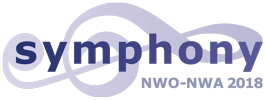PhD students for SYMPHONY project
NWO-Nationale Wetenschapsagenda grant 2018-2019
36 hours per week
Job description
The aim of the project “SYMPHONY: Orchestrating personalized treatment for patients with bleeding disorders” is to establish best treatment choice for each individual with a bleeding disorder based on bleeding tendency. This will be achieved by improving current diagnostic tests to measure hemostatic potential and by performing fundamental research into the pathophysiology behind interindividual differences in bleeding phenotype and treatment response, using novel techniques such as proteomics, and both IPSc and endothelial cellular systems.
This will be achieved by intensive collaborations between the twelve workpackages (WP) (14 fte PhD and 1 fte postdoc), spread over three themes: Diagnostics, Treatment and Fundamental research. Clinical research will focus on among others: a) Treatment optimization by personalization, increasing quality of care at acceptable costs; b) Guidance of complex clinical shared decision making for novel therapeutic options; c) Patient-orchestrated implementation of health care innovations using e-health modules. The SYMPHONY consortium is a broad interdisciplinary cooperation consisting of diverse disciplines: (pediatric) hematology, vascular medicine, clinical genetics, clinical pharmacology, psychology, ethics, epidemiology & methodology, mathematics, health care economics, information & data technology, biochemistry, molecular biology, molecular genetics and cell biology, laboratory medicine, business economics, marketing, sales & patient advocacy.
For this project a total of 14 PhD’s and one Post-doc will be hired.
CLOSING DATE: 17th OF JANUARY 2020
Work environment
The SYMPHONY consortium is a collaboration between the Departments of Pediatric Hematology and Hematology of all six Academic Hemophilia Treatment Centers in the Netherlands (Erasmus MC, AMC, UMCU, UMCG, LUMC, Radboudumc), Department of Public Health Erasmus MC, Sanquin Diagnostics & Sanquin Research, Department of Medical Humanities UMCU, three pharmaceutical companies and the Dutch Patient Society (Netherlands Society of Hemophilia Patients; NVHP).
The SYMPHONY consortium has a yearly General Assembly and many multidisciplinary meetings. The PhD will participate depending on the WP in available and required PhD courses and international conferences.
Qualifications and skills
For these PhD projects we are in search of motivated researchers who have recently graduated as either a biomedical scientist, biochemist, medical biologist, medical doctor (WP06) or a closely related discipline. It is preferable if you have experience in biochemical techniques and laboratory diagnostics for WP03. You also should have excellent writing and communication skills in both English and Dutch.
We are looking for enthusiastic candidates with good social and communication skills, who are ambitious and pro-active, and can work independently. A ‘can do’ mentality, analytical mindset and a demonstrable ability to work in a multidisciplinary team.
Being able to present a certificate of good conduct, a valid proof of identity, diploma’s and/ or relevant registration such as BIG/ RGS are conditions for the appointment.
Information
For more information about this position, please contact Dr. Simone Reitsma, project manager SYMPHONY, phone number: 010-7038200 or contact Dr. Marjon H. Cnossen, principal investigator SYMPHONY, phone number: 010-7036691
Join us and apply now for one of the SYMPHONY projects
[contact-form-7 id=”2103″ title=”Apply”]
This project has received funding from the Netherlands Organisation for Scientic Research (NWO) under grant agreement NWA.1160.18.038. This website reflects only the authors’ view and the NWA is not responsible for any use that may be made of the information it contains.
